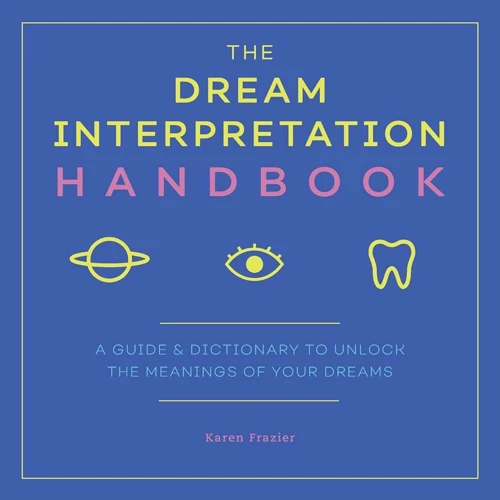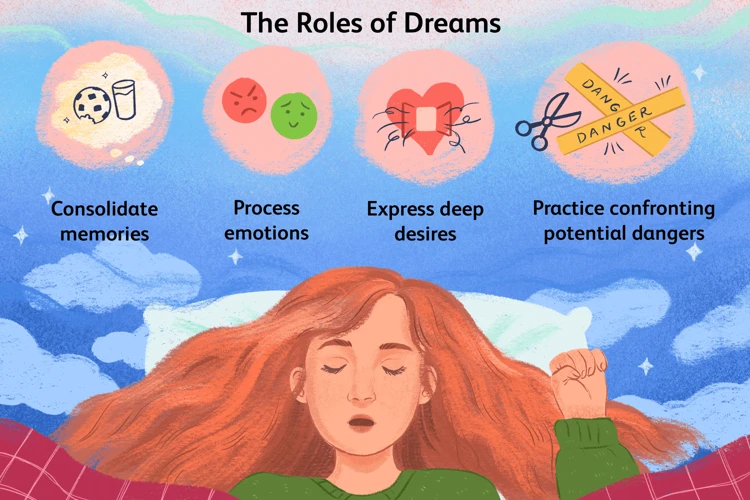Do you ever wake up from a dream feeling like you’re stuck in a loop, experiencing the same scenarios over and over again? Recurring dreams can be both fascinating and puzzling, leaving you wondering about their hidden messages and why they keep happening. In this article, we will explore the intriguing realm of recurring dreams and guide you through the step-by-step process of interpreting them. By uncovering the secrets behind these repetitive visions, you can gain valuable insights into your subconscious mind and discover the messages it is trying to convey. So, let’s embark on this journey together and unlock the mysteries of your recurring dreams.
Why Recurring Dreams Matter

Recurring dreams hold immense significance in the realm of dream interpretation. They matter because they provide a unique opportunity to delve into the depths of our subconscious minds. Unlike random, fleeting dreams, recurring dreams grab our attention by their repetitive nature and persistent presence in our sleep. These dreams often carry hidden messages and symbols that our subconscious mind uses to communicate with us. By unraveling these messages, we can gain profound insights into our emotions, fears, unresolved issues, and even our personal growth. Through recurring dreams, our subconscious mind attempts to bring our attention to certain aspects of our lives that we may have ignored or neglected. By understanding the underlying themes and symbols in these dreams, we can uncover deep-rooted patterns, make connections, and ultimately gain a better understanding of ourselves. Whether it is exploring recurring dream types, understanding unresolved emotions, or embarking on a journey of personal growth, recurring dreams matter because they provide us with an opportunity for self-reflection, personal development, and transformation. So, let’s dive deeper into the world of recurring dreams and unlock the hidden messages they hold.
Common Types of Recurring Dreams

Recurring dreams manifest in various forms, each carrying its own unique symbolism and significance. The common types of recurring dreams can provide valuable insights into our subconscious thoughts and emotions. One prevalent type is falling dreams, which often symbolize a lack of control or fear of failure. Another common recurring dream is being chased, which can indicate a sense of anxiety or avoidance in waking life. Exam dreams, on the other hand, frequently occur during times of stress or pressure, reflecting our concerns about performance and competence. These dreams serve as mirrors into our innermost fears, desires, and unresolved conflicts. By understanding the various types of recurring dreams, we can begin to decipher the hidden messages they hold and gain a deeper understanding of ourselves. To explore more about recurring dream types, you can visit the article “Understanding Recurring Dream Types.”
1. Falling Dreams
Falling dreams are among the most commonly experienced recurring dreams. They often evoke intense emotions and a sense of vulnerability. When we dream about falling, our subconscious mind may be reflecting feelings of insecurity, a lack of control, or fear of failure in our waking life. These dreams can also symbolize a need for grounding or stability. If you frequently have falling dreams, it may be helpful to examine the emotions and situations associated with these dreams. Are there any unresolved emotions or issues in your life that make you feel like you’re on shaky ground? By exploring these emotions and addressing any underlying fears or insecurities, you can work towards finding a sense of balance and security in your waking life. Falling dreams can serve as a catalyst for personal growth. By confronting our fears and embracing change, we can turn these dreams into opportunities for self-discovery and empowerment. So, pay attention to the circumstances and emotions surrounding your falling dreams, and consider how they could be guiding you towards unresolved emotions or personal growth.
2. Being Chased Dreams
Being chased dreams are a common type of recurring dream that often leaves individuals feeling anxious and on edge. In these dreams, the dreamer is being pursued by an unknown entity or a specific person. The feeling of being chased creates a sense of fear and urgency, as if one’s very survival depends on escaping their pursuer. These dreams can be interpreted as a reflection of unresolved emotions or situations in the dreamer’s waking life. The act of being chased symbolizes a sense of running away from a problem or an issue that needs to be addressed. It may indicate a feeling of being overwhelmed or pursued by responsibilities, stress, or unresolved conflicts. The key to understanding the meaning behind being chased dreams lies in examining the emotions evoked during the dream and connecting them to real-life circumstances. Are there any current situations or relationships that make you feel like you’re being pursued or overwhelmed? Are there unresolved emotions or conflicts that you’re trying to avoid? Exploring these questions can provide valuable insights into the messages hidden within your recurring dreams of being chased. By addressing and resolving these unresolved emotions or confronting the issues causing the chase, you can embark on a path of personal growth and find a sense of relief and liberation from these recurring dreams.
3. Exam Dreams
Exam dreams, a common type of recurring dream, often leave individuals feeling anxious and stressed. These dreams typically involve being unprepared for an important exam, arriving late, or forgetting essential study materials. The symbolic meaning behind exam dreams goes beyond the literal interpretation of test-taking. Instead, they reflect our fears of being evaluated, judged, or scrutinized in various aspects of our lives. Exam dreams may arise during times of high-pressure situations or when we face challenging decisions. These dreams serve as a reminder to assess our level of preparedness and confidence in tackling life’s hurdles. They prompt us to reflect on our self-worth, abilities, and areas in which we may feel inadequate or unprepared. Exam dreams can also be seen as opportunities for personal growth and self-improvement. They can motivate us to enhance our skills, knowledge, and preparedness in real-life situations, fostering a sense of self-assurance and success. By addressing the underlying anxiety and insecurities related to exam dreams, we can embark on a journey of self-growth and overcome challenges with greater confidence. So, the next time you find yourself in the midst of an exam dream, remember that it is not just about tests and grades, but a chance to uncover hidden insecurities and embrace personal development.
Understanding Dream Symbols

Understanding dream symbols plays a crucial role in unraveling the messages hidden within recurring dreams. One effective method is keeping a dream journal. By documenting our dreams immediately upon waking, we can record the vivid details and symbols that stood out to us, helping us identify recurring patterns. Additionally, identifying personal symbols can bring us closer to understanding the unique language of our subconscious mind. These symbols can be specific to our own experiences, beliefs, or cultural background. To unlock the meaning behind these symbols, we can explore their personal significance and associations, allowing us to interpret our dreams on a deeper level. By understanding the symbols that appear in our recurring dreams, we can gain valuable insights into our subconscious mind and its connection to our personal growth. So, grab a notebook and start decoding the messages that lie within your dreams.
1. Keeping a Dream Journal
Keeping a dream journal is an essential and powerful tool when it comes to interpreting recurring dreams. By documenting your dreams on a regular basis, you create a valuable resource for analyzing and understanding their hidden meanings. Here are some steps to effectively keep a dream journal:
1. Record your dreams: As soon as you wake up, grab a pen and journal or use a digital note-taking app to write down your dreams. Include as many details as possible, such as the setting, characters, emotions, and actions. Even small details can hold significance in the interpretation process.
2. Date and categorize: Make sure to date each entry in your dream journal. You can also create categories for different types of dreams, such as nightmares, lucid dreams, or recurring dreams. This categorization will help you identify patterns and themes more easily.
3. Reflect on emotions: Take note of the emotions you experienced during the dream and upon waking up. Emotions play a crucial role in dream interpretation as they often reflect your subconscious feelings and concerns.
4. Identify symbols: Pay attention to recurring symbols or themes that appear in your dreams. For example, if you often dream about water, it could symbolize emotions and spirituality. Recognizing these symbols will help you interpret the underlying messages more accurately.
5. Analyze patterns: Look for commonalities or recurring patterns in your dreams. This could be recurring locations, people, or situations. By identifying these patterns, you can uncover deeper meanings and gain insights into your subconscious mind.
6. Reflect and interpret: Regularly review your dream journal entries and reflect on their possible meanings. Consider the context of your waking life and how it relates to the themes or symbols in your dreams. This self-reflection will aid in deciphering the messages that your subconscious is trying to convey.
By diligently maintaining a dream journal and engaging in self-reflection, you will develop a deeper understanding of your recurring dreams and their significance. This introspective practice is an integral part of the journey towards personal growth and self-discovery. So grab your journal and embark on this enlightening adventure of interpreting recurring dreams and uncovering their hidden messages.
2. Identifying Personal Symbols
Identifying personal symbols in recurring dreams is a key step in uncovering their hidden messages. These symbols can be unique to each individual and carry specific meanings and associations. To identify personal symbols, it is important to keep a dream journal where you record the details of your dreams upon waking. Look for recurring elements such as objects, people, animals, or locations that appear consistently in your dreams. Pay attention to the emotions and feelings evoked by these symbols. Once you have identified potential personal symbols, reflect on their significance in your waking life. For example, if you often dream of a wolf, consider what the wolf represents to you. Is it a symbol of strength, independence, or aggression? By decoding the personal meaning of these symbols, you can gain deeper insights into your psyche and the messages your subconscious mind is conveying. Remember, this process requires self-reflection and introspection, and there is no one-size-fits-all interpretation for dream symbols. It is crucial to consider your own unique experiences and associations when analyzing personal symbols. This exploration of personal symbols is an integral part of the journey towards personal growth and self-discovery that recurring dreams can offer. So, embrace the process, dive into your dream journal, and unravel the enigmatic realm of your personal symbols to unlock a wealth of insight and meaning.
Interpreting Recurring Dream Themes

When it comes to interpreting recurring dream themes, it’s important to pay attention to the patterns and symbols that emerge throughout these dreams. One way to do this is by keeping a dream journal. By documenting your dreams, you can identify recurring symbols, emotions, and scenarios that appear consistently. Another key aspect of interpretation is identifying personal symbols. These symbols may hold unique meanings to you based on your own experiences and associations. By recognizing and understanding these symbols, you can unlock the hidden messages and insights contained within your recurring dreams. Whether it’s exploring emotional patterns or unraveling power struggles, interpreting recurring dream themes allows us to gain a deeper understanding of ourselves and our subconscious mind. By connecting the dots and exploring the recurring themes, we can embark on a journey of self-discovery and personal growth.
1. Emotional Patterns
Understanding the emotional patterns in recurring dreams is a key aspect of interpretation. These patterns can reveal deep-seated emotions and unresolved issues that our subconscious mind is trying to process. One way to identify these emotional patterns is by keeping a dream journal. By recording your recurring dreams and analyzing the emotions associated with them, you can start to see common themes or feelings that arise. Pay attention to the strong emotions that surface consistently in different scenarios. Are you feeling fear, anxiety, sadness, or frustration? These emotions may indicate underlying fears or unresolved issues that need attention.
Another method is to identify personal symbols that are present in your recurring dreams. These symbols can be objects, people, or even specific situations that hold personal significance to you. For example, if you frequently dream about being chased by a menacing figure, it may symbolize a feeling of being pursued or overwhelmed in your waking life. By recognizing and understanding these personal symbols, you can uncover the underlying emotional patterns in your dreams.
Emotional patterns in recurring dreams play a significant role in personal growth and self-reflection. By addressing these emotions and exploring their roots, you can gain insight into areas of your life that may require attention and growth. Understanding these patterns can lead to a deeper understanding of yourself and help you navigate through challenges and obstacles. So, embrace the exploration of your emotional patterns in recurring dreams, as it can be a powerful tool for personal growth and transformation.
2. Power Struggles
2. Power Struggles
Power struggles are a common recurring dream theme that can signify the internal conflicts and dynamics of control within ourselves or our relationships. These dreams often feature scenarios where we feel dominated, overpowered, or have a lack of control. It could be a dream where we are battling against an oppressive force, struggling to find our voice, or constantly competing for power and recognition. This dream theme can indicate deep-seated feelings of powerlessness, inequity, or a need for autonomy in our waking life. By analyzing the specific symbols and emotions associated with these dreams, we can gain a better understanding of the power dynamics at play. It may signify a need to assert ourselves, set boundaries, or address issues in our relationships or personal life where power imbalances exist.
In these dreams, symbols such as conflicts, fights, or power struggle scenarios may appear. Pay attention to the emotions experienced during these dreams – frustration, anger, fear, or helplessness. These emotions provide valuable clues to the underlying issues that need to be addressed. By reflecting on the recurring nature of power struggle dreams and exploring their hidden meanings, we can make connections between our dream experiences and real-life situations where power dynamics come into play. Understanding and resolving these power struggles in our dreams can lead to personal growth, assertiveness, and the development of healthier relationships. So, embrace the insights provided by these dreams and explore how they can contribute to your journey of personal growth and empowerment.
3. Unresolved Issues
Unresolved issues are a common theme in recurring dreams, pointing to areas of our lives that require attention and resolution. These dreams act as a mirror, reflecting back to us the unresolved conflicts or emotions that we may have buried deep within our subconscious mind. These unresolved issues can stem from past experiences, relationships, or even internal struggles that we have yet to address. In the realm of dream interpretation, these dreams serve as a gentle nudge, urging us to confront and heal these unresolved aspects of ourselves. By paying close attention to the symbols and emotions present in these dreams, we can gain valuable insights into the specific issues that require our attention. It could be a past trauma that needs healing, a relationship that needs closure, or a fear that needs to be overcome. Exploring and resolving these lingering issues can lead to personal growth, allowing us to move forward with a sense of inner peace and liberation. So, if you find yourself encountering recurring dreams that highlight unresolved issues, it may be time to embark on a journey of self-discovery and healing. By addressing these underlying concerns, you can pave the way for personal growth and transformation.
Uncovering Hidden Messages

Uncovering hidden messages in recurring dreams is like deciphering a cryptic puzzle that our subconscious mind presents to us. To begin this intriguing process, it is crucial to pay attention to the details within the dream. Taking note of specific symbols, emotions, and recurring elements can provide valuable clues to unravel the hidden meanings. Seeking patterns and connections within our recurring dreams is another essential step. By analyzing similarities or recurring themes across multiple instances of the dream, we can gain a deeper understanding of the underlying messages being conveyed. However, sometimes navigating the complexities of dream interpretation may require the guidance of a professional. Consulting with a dream analyst or therapist who specializes in dream work can offer valuable insights and interpretations, helping us gain a clearer understanding of the hidden messages within our recurring dreams. Ultimately, by diligently exploring and unraveling the enigmatic nature of recurring dreams, we can uncover profound insights, promote personal growth, and embark on a transformative journey of self-discovery.
1. Paying Attention to Details
When it comes to interpreting recurring dreams, paying attention to details is paramount. Every element, no matter how small or seemingly insignificant, can hold valuable clues to understanding the hidden messages within the dream. One effective way to analyze the details is by keeping a dream journal. By recording your dreams immediately upon waking up, you can capture even the fleeting details before they fade from memory. Take note of the setting, characters, objects, emotions, and any recurring symbols or themes. Look for patterns that emerge across multiple dreams, as they may indicate recurring messages. Another aspect of paying attention to details is analyzing the emotions associated with the dream. Note how you feel during the dream and upon waking up. Emotions often serve as a guide to understanding the underlying messages and unresolved issues.
Additionally, examine the symbolism within the dream. Symbols can vary in meaning from person to person, so it’s important to identify your personal symbols. For example, a snake may represent wisdom and transformation for one person, while it may symbolize fear and danger for another. Reflect on your own experiences and associations to gain a deeper understanding of the symbols present in your dreams. Remember, paying attention to details allows you to uncover the intricate layers of meaning hidden within your recurring dreams and can lead to personal growth. By honing your observation skills and analyzing the details, you can unlock the messages of your subconscious mind and embark on a journey of self-discovery and transformation.
2. Seeking Patterns and Connections
When it comes to interpreting recurring dreams, seeking patterns and connections plays a crucial role in uncovering their hidden messages. Our dreams are often filled with symbols, themes, and emotions that repeat themselves across different dream scenarios. By carefully examining these recurring elements, we can start to identify patterns that may provide valuable insights. Look for common symbols or situations that frequently appear in your dreams. Are there specific colors, objects, or locations that reoccur? Pay attention to the emotions associated with these patterns as well. Are you experiencing fear, joy, or anxiety in similar dream scenarios? By identifying these patterns, you can begin to draw connections between your dreams and your waking life experiences. For example, if you repeatedly dream about being chased, it may reflect an underlying sense of anxiety or a feeling of being pursued by a problem or challenge in your life. By connecting the dots and reflecting on these recurring patterns, you can gain a deeper understanding of yourself, your subconscious mind, and the messages your dreams are trying to convey. So, embrace the detective mindset and explore the intricate patterns and connections within your recurring dreams. They may hold the key to unlocking personal growth and self-discovery.
3. Consulting a Professional
When it comes to interpreting recurring dreams, it can sometimes be helpful to consult a professional. These individuals, such as psychotherapists, dream analysts, or psychologists, specialize in the field of dream interpretation and can provide valuable insights and guidance. Here are a few reasons why consulting a professional can be beneficial:
1. Expertise and Experience: Professionals who specialize in dream interpretation have extensive knowledge and experience in understanding the complexities of the human mind and the symbolism within dreams. They can offer a fresh perspective and help uncover hidden meanings that may not be evident to the dreamer. Their expertise allows them to navigate through the layers of symbolism and identify recurring patterns and themes in dreams.
2. Objective Analysis: Consulting a professional provides an outside perspective that is not influenced by personal biases or emotions. They can objectively analyze the dream content and provide interpretations based on their expertise. This can be particularly helpful when the dreamer is too closely involved in the dream’s subject matter and may have difficulties separating their own emotions from the symbols presented in the dream.
3. Guidance in Integration: Dreams, especially recurring ones, can often provide insights into unresolved issues, personal growth, and self-discovery. A professional can guide the dreamer in integrating the messages and symbols from their recurring dreams into their daily life. They can help the dreamer explore possible meanings, identify patterns, and offer recommendations or strategies for personal growth and development.
While consulting a professional can provide valuable assistance, it’s important to find someone who aligns with your beliefs and values. Look for individuals who have expertise in dream analysis and are reputable in their field. With their guidance, you can unlock the hidden messages within your recurring dreams and embark on a journey of self-discovery and personal growth. So, if you find that your recurring dreams continue to mystify you, seeking the expertise of a professional may lead to a deeper understanding of yourself and your dreams.
Applying Dream Interpretation to Real Life
Applying dream interpretation to real life is a powerful tool for personal growth and self-reflection. When we take the time to analyze and understand the hidden messages within our dreams, we can gain valuable insights that can be applied to our waking lives. One way to do this is through problem-solving. Recurring dreams often highlight unresolved issues or challenges we may be facing, and by interpreting these dreams, we can identify possible solutions and approaches to addressing those problems. Additionally, dream interpretation allows for deep self-reflection, enabling us to explore our emotions, fears, and desires at a subconscious level. By bringing these insights into our conscious awareness, we can make better-informed decisions and foster personal growth. By integrating the lessons and messages from our recurring dreams into our daily lives, we have the opportunity to transform ourselves and move forward on a path of self-discovery and personal development. So, embrace the power of dream interpretation and embark on a journey of self-exploration and personal growth.
1. Problem-Solving
When it comes to interpreting recurring dreams, one of the main purposes they serve is problem-solving. Our subconscious mind often uses these dreams as a way to present us with challenges or dilemmas that we may be facing in our waking lives. It is through these repetitive dreams that our mind attempts to provide us with potential solutions or alternative perspectives. By analyzing the recurring themes, symbols, and emotions present in these dreams, we can gain insights into the issues we are grappling with. Pay attention to any recurring problem or scenario in your dreams, as it may reflect an unresolved situation in your waking life. Perhaps there is a conflict that needs addressing, a decision that requires careful consideration, or a challenge that demands creative thinking. By recognizing the problem-solving nature of these dreams, we can use them as a tool to brainstorm solutions, explore different possibilities, and gain clarity on the best course of action to take. So the next time you experience a recurring dream, embrace it as an opportunity for problem-solving and trust that your subconscious mind is guiding you towards finding the answers you seek. It’s like having a personal dream mentor nudging you towards resolution and growth.
2. Self-Reflection
Self-reflection is a key aspect of interpreting recurring dreams. When we engage in self-reflection, we take the time to analyze our thoughts, emotions, and behaviors in order to gain a deeper understanding of ourselves. In the context of recurring dreams, self-reflection involves examining the recurring themes, symbols, and emotions present in our dreams. By exploring these elements, we can uncover insights about our subconscious mind’s perception of ourselves, our relationships, and the world around us.
Recurring dreams often spotlight aspects of our lives that we may be ignoring or suppressing. Through self-reflection, we can identify patterns and connections between our dreams and our waking life experiences. For example, if we constantly dream of being chased, it may signify that we are avoiding confronting a particular fear or challenge in our lives. By reflecting on this recurring theme, we can gain the courage to face our fears head-on and overcome them.
Self-reflection also allows us to examine our emotions within the context of recurring dreams. Are we feeling anxious, scared, or helpless in these dreams? Understanding these emotions can provide valuable insight into our subconscious concerns and unresolved issues. By acknowledging and addressing these emotions, we can take steps towards healing and personal growth.
Self-reflection helps us recognize the hidden messages and lessons our recurring dreams are trying to convey. It allows us to see beyond the surface-level content of our dreams and delve into the deeper meanings and symbolism. Taking the time to contemplate our dreams and their significance can lead to powerful epiphanies and awakenings.
Incorporating self-reflection into the interpretation of recurring dreams requires patience, openness, and a willingness to explore our inner selves. By actively engaging in this process, we can gain a greater understanding of who we are, our desires, and the changes we may need to make in order to live more fulfilling lives.
So, let us embark on this journey of self-reflection and unlock the transformative power of recurring dreams. Through introspection and contemplation, we can harness the wisdom of our dreams to guide us towards self-discovery, personal growth, and a more authentic existence.
3. Personal Growth
Personal growth is a transformative journey that recurring dreams can often lead us on. In these dreams, our subconscious mind may be nudging us to explore our inner selves, confront our fears, and embrace personal development. These dreams can present scenarios that challenge us, pushing us out of our comfort zones to foster growth. It is through these dream experiences that we can tap into our hidden potential and discover new aspects of ourselves. Recurring dreams related to personal growth often involve symbolism that represents our desire for change, self-improvement, and a deeper understanding of our true selves. These dreams may encourage us to reflect on our choices, habits, and beliefs, prompting us to make positive changes in our waking lives. By paying attention to the messages and symbols within these dreams, we can use them as tools for self-reflection and guide ourselves towards a path of personal growth. It’s important to approach these dreams with an open mind and a willingness to embrace change. Engaging in practices such as journaling, meditation, and seeking guidance from professionals can further enhance our personal growth journey. So, let recurring dreams become a catalyst for personal growth, allowing us to unlock our full potential and live a more fulfilling life.
Conclusion
In conclusion, recurring dreams are a fascinating phenomenon that can offer valuable insights into our subconscious mind. Through their repetitive nature, these dreams capture our attention and beckon us to explore their hidden messages. By understanding the common types of recurring dreams, such as falling dreams, being chased dreams, and exam dreams, we can begin to decipher the symbols and themes they present. Keeping a dream journal and identifying personal symbols can further aid in interpreting these recurring dreams. It is important to pay attention to the emotional patterns, power struggles, and unresolved issues that these dreams often reflect. By seeking patterns and connections, as well as consulting a professional if needed, we can gain a deeper understanding of the messages within our recurring dreams. Applying dream interpretation to real life allows us to engage in problem-solving, self-reflection, and personal growth. As we navigate through the intricacies of our recurring dreams, we embark on a journey of self-discovery and transformation. So, embrace the mysteries of your dreams and unravel the hidden meanings that lie within.
Frequently Asked Questions
1. Can recurring dreams have different meanings each time they occur?
Yes, recurring dreams can have varying meanings each time they manifest. The symbols and themes in recurring dreams tend to evolve as our thoughts, emotions, and circumstances change over time.
2. Are recurring dreams only related to unresolved issues?
No, while unresolved issues can be a common theme in recurring dreams, they can also reflect a range of other emotions, fears, desires, or even personal growth opportunities. It’s important to consider the context and details of the dream to interpret its meaning accurately.
3. Do all recurring dreams have hidden messages?
Not all recurring dreams have hidden messages, but many do. Recurring dreams can be a way for our subconscious mind to communicate important information or to draw attention to areas of our lives that need exploration or resolution.
4. Can recurring dreams be influenced by external factors?
Absolutely! External factors such as daily experiences, stressors, relationships, and even certain environmental triggers can influence the content and frequency of recurring dreams. Paying attention to these influences can provide valuable insights into the dream’s meaning.
5. How can keeping a dream journal help in interpreting recurring dreams?
Keeping a dream journal allows you to capture the details of your recurring dreams, identify patterns, and observe any changes over time. It helps in analyzing the symbols, emotions, and themes, aiding in the interpretation process.
6. Is it necessary to consult a professional for recurring dream interpretation?
While consulting a professional, such as a therapist or a dream analyst, can provide expertise and guidance, it is not always necessary. With self-reflection, research, and utilizing available resources, individuals can often interpret recurring dreams themselves.
7. Can recurring dreams be influenced by past traumas?
Yes, past traumas can often manifest in recurring dreams as a way for the subconscious mind to process unresolved emotions or trauma-related experiences. Understanding the connection between the dream and past traumas can be helpful in healing and finding closure.
8. Are there any techniques to induce or control recurring dreams?
While there is no guaranteed method to induce or control recurring dreams, practicing lucid dreaming techniques, such as reality checks, dream affirmations, and keeping a consistent sleep schedule, may increase the likelihood of experiencing recurring dreams.
9. Can recurring dreams provide insights into our personal relationships?
Absolutely! Recurring dreams can reflect aspects of our personal relationships, including unresolved conflicts, power dynamics, or patterns of behavior. Analyzing these dreams can provide valuable insights into our emotions and interactions within our relationships.
10. Can recurring dreams help in personal growth and self-awareness?
Definitely! Recurring dreams often offer opportunities for personal growth and self-awareness. By unraveling their hidden messages, we can gain a deeper understanding of ourselves, our emotions, and areas in our lives that require attention, leading to personal development and self-improvement.








